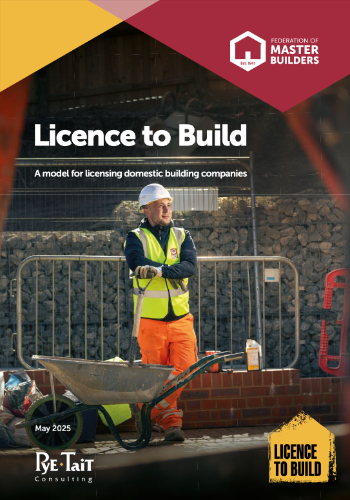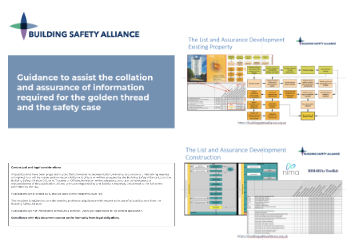How to find a builder
Contents |
[edit] Introduction
A builder is a tradesperson that can be employed by a client to undertake building works. Typically, the word 'builder' is associated with relatively small works such as such as house building, extensions, renovation works, and so on. Larger or more complex projects are generally undertaken by 'contractors', although the distinction between the two is not always clear. For more information see: Builder v contractor and How to find a contractor.
Appointing a builder can be a daunting responsibility, particularly for domestic clients who may not have used a builder before. However, it is important that great care is taken to ensure the selection process is thorough. There are several steps that can be taken to find the most appropriate builder.
[edit] Trade body
Check whether the builder is a member of a recognised trade association, such as the Federation of Master Builders (FMB) or the National Federation of Builders (NFB). While membership is not mandatory, it can demonstrate a certain level of reliability and provide a degree of consumer protection. However, it is worth checking with the trading body that the builder is actually a member, as there have been cases of builders claiming membership fraudulently.
Builders may also have the government-endorsed ‘TrustMark’ seal of approval which indicates that they meet trading standards.
[edit] Recommendations and references
Getting personal recommendations can help identify a suitable and reliable builder. When asking for recommendations, questions worth asking might relate to the quality of the workmanship, the cost, the length of time it took to complete work, whether any problems arose and how they were dealt with, how tidy they were, how busy they are, how long it took for them to start, and so on.
It can also be worth asking for recommendations from plumbers, electricians and other tradespeople who will have worked with a number of different builders during their career. Similarly, architects may be able to recommend builders with expertise suited to the project.
There are several websites that serve as useful sources for finding builders, offering an indication of their quality through reviews and ratings. Recommendations can also be found on social media, although these should always be balanced with some direct feedback wherever possible.
[edit] Advertising
A number of forums are now available where clients can post the details of work they require, and builders can then express an interest.
[edit] Interviews
Once a shortlist has been prepared, it is important to meet prospective builders. Not only will this give an insight into their suitability, it is a chance for both parties to ask questions. Builders may also be able to suggest alternative ways of carrying out the work.
[edit] Quotations
A clear description of the work, and the form of agreement that will be used, should be prepared for the builders to price against. Builders should be asked to itemise their price against the list. This allows the client to identify items that my be expensive, and also allows a detailed comparison between the prices of different contractors, which can help in negotiating the final price that will be paid.
As well as a price, builders might be asked to provide information about:
- Relevant experience and qualifications.
- Whether they use sub-contractors.
- What is covered by the quotation and what is not (i.e. site maintenance, clearance, material supplies, and so on).
- How long the price is guaranteed for.
- Details relating to VAT.
- How building regulations approval will be dealt with.
- Certificates of insurance providing cover against property damage and personal and public liability. For more information, see Making sure your builder has appropriate insurance.
- Design proposals if these have been requested.
[edit] Agreement
Once a builder has been selected, a contract should be drawn up. This could be a standard agreement offered by the contractor, or an industry agreement such as the JCT minor works contract, or the RIBA Domestic Building Contract.
The agreement should include the details of the work required, start and completion dates, the price, insurance requirements, penalties for late completion, dispute resolution procedures, responsibility for CDM, retention, and so on. For more information see: Contract conditions.
Payment terms should be agreed before work begins, whether the builder is to be paid in full at the end or in pre-agreed stages, with a final payment held back until the work is complete and any snags have been rectified. A cash deposit or upfront payment should be avoided if possible, unless specialist building materials have to be purchased, and then ownership of those materials should be vested in the client. For more information, see Vesting certificate for construction goods plant or materials.
[edit] Related articles on Designing Buildings Wiki
- Avoiding planning permission pitfalls.
- Building an extension.
- CDM for self-builders and domestic clients.
- Construction contractor.
- Finding good building contractors.
- Hiring an architect as a domestic client.
- How to build a porch.
- How to find a contractor.
- Making sure your builder has appropriate insurance.
- Planning permission.
- Self-build homes.
Featured articles and news
International Electrician Day, 10 June 2025
Celebrating the role of electrical engineers from André-Marie Amperè, today and for the future.
New guide for clients launched at Houses of Parliament
'There has never been a more important time for clients to step up and ...ask the right questions'
The impact of recycled slate tiles
Innovation across the decades.
EPC changes for existing buildings
Changes and their context as the new RdSAP methodology comes into use from 15 June.
Skills England publishes Sector skills needs assessments
Priority areas relating to the built environment highlighted and described in brief.
BSRIA HVAC Market Watch - May 2025 Edition
Heat Pump Market Outlook: Policy, Performance & Refrigerant Trends for 2025–2028.
Committing to EDI in construction with CIOB
Built Environment professional bodies deepen commitment to EDI with two new signatories: CIAT and CICES.
Government Grenfell progress report at a glance
Line by line recomendation overview, with links to more details.
An engaging and lively review of his professional life.
Sustainable heating for listed buildings
A problem that needs to be approached intelligently.
50th Golden anniversary ECA Edmundson apprentice award
Deadline for entries has been extended to Friday 27 June, so don't miss out!
CIAT at the London Festival of Architecture
Designing for Everyone: Breaking Barriers in Inclusive Architecture.
Mixed reactions to apprenticeship and skills reform 2025
A 'welcome shift' for some and a 'backwards step' for others.
Licensing construction in the UK
As the latest report and proposal to licence builders reaches Parliament.
Building Safety Alliance golden thread guidance
Extensive excel checklist of information with guidance document freely accessible.
Fair Payment Code and other payment initiatives
For fair and late payments, need to work together to add value.
Pre-planning delivery programmes and delay penalties
Proposed for housebuilders in government reform: Speeding Up Build Out.
High street health: converting a building for healthcare uses
The benefits of health centres acting as new anchor sites in the high street.
























